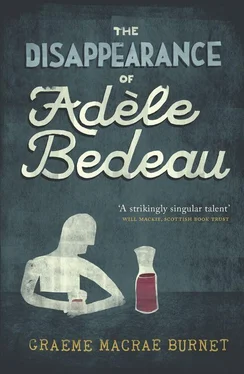At lunch, Pasteur did not look up from behind the counter when Manfred entered the Restaurant de la Cloche. Dominique arrived at his table and Manfred ordered the andouillette as he always did. Most of the tables were occupied, but there was little of the normal hubbub of a lunchtime service. Was the curiously subdued atmosphere on account of his presence? He was sure the eyes of the room were upon him, but whenever he looked up from his food no one was looking in his direction. Nevertheless, Manfred sensed that the occupants of the restaurant would breathe a collective sigh of relief when he left. Pasteur did not glance in his direction for the duration of the meal and when he paid his bill, no reference was made to the events of the previous evening. It was the proprietor’s part in his exclusion from the game that most wounded Manfred. He had always thought of Pasteur as an ally. It was true that he did not greet him with any special warmth or favour him over other customers. But he had on occasion shot Manfred a conspiratorial look when Lemerre was behaving unpleasantly. It was a meagre foundation upon which to construct a friendship, but Manfred had, nevertheless, thought of Pasteur as his friend.
All the same, as Manfred walked back to the bank, his mood lightened a little. It was a bright day and no one so much as glanced at him. It was not, Manfred told himself, because people were avoiding his gaze, but simply because there was nothing exceptional about him. His headache had subsided and his earlier thoughts about Alice seemed silly. It was absurd to think that Gorski would have gone to so much trouble to entrap him. He had met Alice only the day after Gorski had first visited him in his apartment. Manfred smiled at how ridiculous the idea that Alice was working for the police had been. Of course, there had been a degree of chance to their encounters, a degree of chance which could, when one enumerated it, make the whole thing seem highly improbable, but was that not always the case when two strangers met?
In his office Manfred took the telephone book from the bottom drawer of his desk. There was no harm in setting his mind to rest once and for all. All he had to do was call all the stationery firms in town and ask for Alice Tarrou. If Alice’s story was not true, there would be no entry for her company in the directory. It was as simple as that. Manfred flicked through the pages. There were no stationery companies listed in Saint-Louis. He found two printing companies. That was almost the same thing. Manfred picked up the receiver, then hesitated before calling the first number. He did not know if Tarrou was Alice’s married or maiden name. Perhaps she still used her ex-husband’s name at work. He would just ask for Alice. He would recognise her voice if she came on the line. Then he could just hang up.
He dialled the first number. It rang for some time before a gruff male voice answered.
‘May I speak to Alice?’ said Manfred.
‘Alice who?’ the man said.
Manfred hesitated. ‘I’m not sure of her second name,’ he said. ‘I wrote it down, but I seem to have lost the slip of paper.’
‘You’ve got the wrong number, pal,’ said the man. ‘There’s no Alice here.’
Then he hung up.
Manfred replaced the receiver. His heart was beating a little faster. He tried the second number. This time a young woman answered and told him that no one called Alice worked there. Manfred apologised for troubling her. He ran his hand over his chin. It had the texture of sandpaper. Was it possible, after all, that Alice had concocted the story of the stationery company? He realised that she had not said that the firm was located in Saint-Louis. He looked again in the directory. Two stationer’s and three printing firms were listed in Mulhouse. Manfred dialled the first number. A girl answered.
‘I wondered if I could speak to Alice,’ said Manfred.
‘Alice isn’t here,’ said the girl. ‘Can I help you?’
Manfred paused. He could hardly ask the girl what Alice’s surname was. ‘No,’ he said, ‘it’s a personal matter. Will she be back later?’
‘I’m not sure,’ said the girl. ‘If you give me your number, I’ll get her to call you.’
‘That’s all right,’ said Manfred, ‘I’ll try again later.’ Then he put the phone down.
He spent what was left of the afternoon going over the conversation in his mind. There was nothing distinctive about his voice, but the girl was sure to mention that a man had called. Would Alice guess it was him? Perhaps she would think nothing of it, but Manfred did not wish her to know he had been snooping on her, that he had called her office in order to verify what she had told him. That was not how normal people behaved. On top of that, the whole exercise had been futile. Unless he did call back, which he had no intention of doing, he had no way of knowing that it was the same Alice. It was a common enough name.
Manfred asked Mlle Givskov to close up the bank and left early. He was tempted to nip round to Le Pot for a quick glass, but the thought of running into Lemerre deterred him. He could not think of another suitable establishment. Instead he stopped off in a grocer’s shop and bought two bottles of red wine. Apart for his usual nightcap, which he took only to help him sleep, he did not make a habit of drinking in his apartment. There was something wretched about drinking at home. The bottles clanked noisily in the brown paper bag in which the grocer had placed them. Manfred removed one of them and slipped it into the outer pocket of his raincoat.
As he approached the apartment building, he was surprised to see Gorski emerge from the entrance. He looked around, as if to ascertain whether anyone had seen him, and started to walk in Manfred’s direction. Manfred did not know what to do. It was too late to cross the road and there was no suitable place to conceal himself. In any case, he would not want Gorski to think that he was trying to avoid him. He had no choice but to keep going. The detective gave no indication of having seen him. Then, when they were no more than five metres apart, Gorski nodded curtly and walked straight past him. Manfred continued to his apartment. If Gorski had not wished to speak to him, what was he doing in the apartment building? Manfred placed the two bottles on his kitchen table. He opened one and poured himself a glass. He stepped out onto the balcony overlooking the play park. Alice’s silver sports car was parked in its usual place.
GORSKI WAS SITTING in the communal area of the station behind the reception window, leafing through his interview notes. He didn’t like to closet himself in his office. It gave the impression that he was aloof and he did not like the idea that the other cops might be talking about him. Some of his colleagues still resented Gorski’s status as Ribéry’s protégé. All that had been twenty years before, but his reputation for currying favour with authority had stuck, at least with the older members of the force.
Schmitt was manning the desk. He had a newspaper spread in front of him on the counter. Gorski had on a number of occasions requested that he refrain from reading his newspaper in view of the public, but Schmitt simply ignored him and eventually he had let it drop. By the time Gorski joined the station, Schmitt had already been confined to desk duties due to some ill-defined medical complaint. He made no secret of his disdain for the young detective. Gorski for his part would have dearly loved to get rid of him. He fantasised at length about forcing him into retirement. He had the power to do so, but he lacked the appetite for confrontation. In any case, such an action would only provoke further resentment among the fraternity of older officers.
Читать дальше












